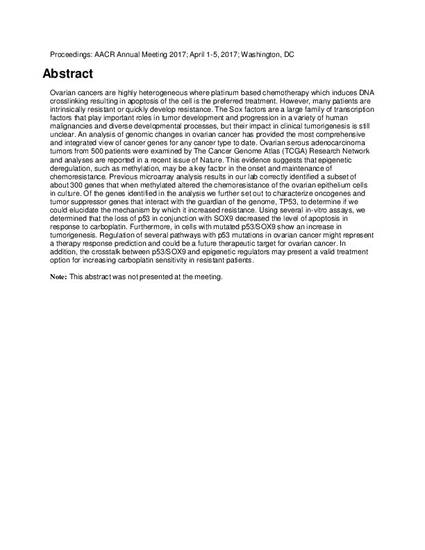
Ovarian cancers are highly heterogeneous where platinum based chemotherapy which induces DNA crosslinking resulting in apoptosis of the cell is the preferred treatment. However, many patients are intrinsically resistant or quickly develop resistance. The Sox factors are a large family of transcription factors that play important roles in tumor development and progression in a variety of human malignancies and diverse developmental processes, but their impact in clinical tumorigenesis is still unclear. An analysis of genomic changes in ovarian cancer has provided the most comprehensive and integrated view of cancer genes for any cancer type to date. Ovarian serous adenocarcinoma tumors from 500 patients were examined by The Cancer Genome Atlas (TCGA) Research Network and analyses are reported in a recent issue of Nature. This evidence suggests that epigenetic deregulation, such as methylation, may be a key factor in the onset and maintenance of chemoresistance. Previous microarray analysis results in our lab correctly identified a subset of about 300 genes that when methylated altered the chemoresistance of the ovarian epithelium cells in culture. Of the genes identified in the analysis we further set out to characterize oncogenes and tumor suppressor genes that interact with the guardian of the genome, TP53, to determine if we could elucidate the mechanism by which it increased resistance. Using several in-vitro assays, we determined that the loss of p53 in conjunction with SOX9 decreased the level of apoptosis in response to carboplatin. Furthermore, in cells with mutated p53/SOX9 show an increase in tumorigenesis. Regulation of several pathways with p53 mutations in ovarian cancer might represent a therapy response prediction and could be a future therapeutic target for ovarian cancer. In addition, the crosstalk between p53/SOX9 and epigenetic regulators may present a valid treatment option for increasing carboplatin sensitivity in resistant patients.
Available at: http://works.bepress.com/noelle-cutter/1/

This abstract was not presented at the meeting.